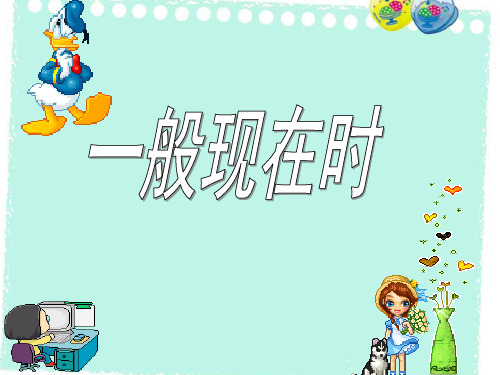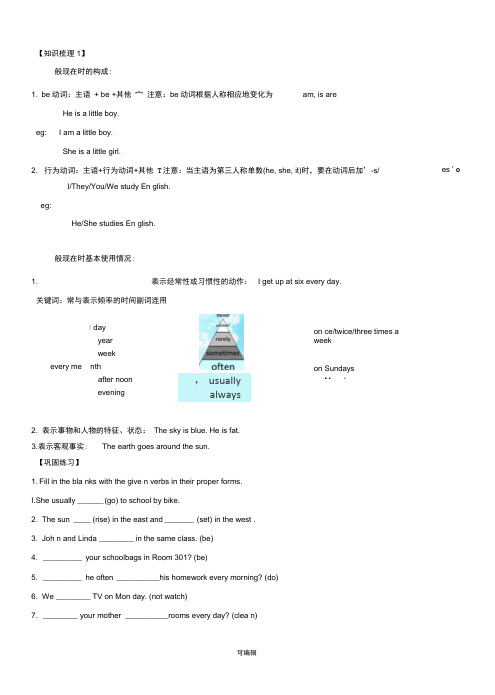一般现在时改写句子
小学英语一般现在时专项练习题

一般现在时专项练习1.概念:一般现在时表示经常的、习惯性的动作或存在的状态一般现在时表示现在经常反复发生的动作、存在的状态或习惯性的动作的时态。
可概括为①经常性或习惯性动作;②长期存在的特征或状态;③普遍真理、客观事实等。
2.构成:一般现在时的构成主要有两种形式,一般现在时用行为动词的原形,但第三人称单数作主语时,动词的词尾要加-S。
:(1)be型:句子的谓语动词只有be(am,is或are):a.肯定句中,只出现be,如:I am a student.我是一名学生。
b.否定句中,要在be后面加not,如:She isn't a teacher.她不是教师。
c.一般疑问句,要将be放在句子开头(注意句首字母大写),句尾用问号,答语用Yes,主语+be.或No,主语+be+not.如:—Are you ready?—你准备好了吗?—Yes,I am.—是的,我准备好了。
(—No,I'm not.—不,我没准备好。
)(2)实义动词型:句中的谓语动词为实义动词(也叫行为动词):a.肯定句中,只出现实义动词,如:I get up in the morning.我早晨起床。
b.否定句中,要在实义动词前面加do(does)+not,do(does)作助动词,本身无意义,常与not缩写成don't(doesn't),如:I don't like vegetables.我不喜欢蔬菜。
c.一般疑问句,要在句子开头加助动词Do(does),句尾用问号,简略答语用Yes,主语+do(does).或No,主语+do(does)+not.如:—Do you like oranges?—你喜欢桔子吗?—Yes,I do.—是的,我喜欢。
(—No,I don't.—不,我不喜欢。
)3, 一般现在时的用法1) 经常性或习惯性的动作,常与表示频腮度的时间状语连用。
时间状语:every…, sometimes, at…, on SundayI leave home for school at 7 every morning.2) 客观真理,客观存在,科学事实。
小升初英语语法:一般现在时

16. She _g_o_e_s__ (go) to school from Monday to Friday.
“辅音字母+y”结尾 变y为i, 再加-es,
fly—flies
特殊情况
have→has do→does go→goes
4、实义动词的一般现在时的基本句型
1) 肯定句:
☺主语(I/We/You/They)+实义动词原形+其他 如:I stay at home on Saturdays. They have sports every day.
回顾一
一般现在时的含义
一般现在时表示经常性或习惯性的动作或存在 的状态等。它通常和表示时间状语连用。
例如: Tom goes to school at 7:30 in the morning.
基本用法
1. 表示现在的情况或状态,或者经常性、习 惯性的动作或状态
I wash the dishes every day. You sometimes take a bus home. They usually have lunch at 11:30. He always gets up early. She is often late for school.
I will visit him when I am free. 我有空就去拜访他。 We will have picnic if it doesn't rain tomorrow. 如果明天不下雨,我们就去野餐。 b.表示按规定,计划,时间要发生的动作。 The plane takes off at 11:00. 飞机11点起飞。 c.表示客观性很强的将来。 Today is Wednesday,so tomorrow is Thursday. 今天是星期三,所以明天是星期四。
一般现在时与现在进行时讲解及练习

一般现在时一、定义与讲解:一般现在时表示经常或习惯性的动作或一般性事实。
,也可表示现在的状态或主语具备的性格和能力。
通常与副词every day(每天),always(总是),usually(通常),often(经常)sometimes (有时),等时间状语连用。
例:(1)表示事物或人物的特征、状态。
The sky is blue.天空是蓝色的。
Mary’s father is an English teacher. 玛丽的爸爸是一名英语老师。
(2)表示经常性或习惯性的动作。
I get up at six every day.我每天六点起床。
She plays sports every day. 她每天都做运动。
(3)表示客观现实。
The table has four legs.桌子有四条腿。
There are 50 students in my class. 我们班有50个学生。
(4)表示客观真理,科学原理,自然现象,等客观事实或格言谚语等。
The sun rises in the east every day.太阳每天从东方升起。
The earth goes around the sun.地球绕着太阳转。
(5)表示平日的喜好。
I like bananas. We don’t like vegetables.He likes ice cream. She doesn’t like strawberries.二.只有主语在第三人称单数时用动词的“三单形式”,其他人称用动词原形。
★动词三单形式的变化规则:1.(1)多数直接在动词词尾加-s.play — plays like — likesask---asks work---works get---gets call---calls(2)以字母s, x, ch, sh或o结尾的动词,在词尾直接加-es.watch---watches wish---wishes do---does go---goes(3)以“辅音字母加 - y”结尾的动词,要先变y为i再加-es.try---tries study---studies cry---cries fly---flies2.不规则变化:be---- is have----has三、一般现在时的句子转换:(1)变一般疑问句:当句子中有be动词或情态动词时,则把be动词或情态动词(can,could 等)提到主语的前面,(口诀:一调二变三问号);(2)变否定句:在be动词或情态动词后面直接加not变成否定句. (be后not莫忘记) 例:①陈述句:She is my sister..疑问句→ Is she your sister? Yes, I am./ No, I’m not.否定句→ She is not my sister.②陈述句:I can play soccer.疑问句→ Can you play soccer? Yes,Ican./ No, I can’t.否定句→ I can not /can’t play soccer.★注意:对一般疑问句的回答:一般用什么问就用什么来回答。
一般现在时

一般现在时讲解与练习一、一般现在时的功能1.表示事物或人物的特征、状态。
如:The sky is blue.天空是蓝色的。
2.表示经常性或习惯性的动作。
如:I get up at six every day.我天天六点起床。
3.表示客观现实。
如:The earth goes around the sun.地球绕着太阳转。
二、一般现在时的构成1. Be 动词的一般现在时结构:主语+be(am,is,are) +其它。
如:I am a boy.我是一个男孩。
2. 实义动词的一般现在时结构:①主语+实义动词原形+其它。
如:We study English.我们学习英语。
②主语(三单)+实义动词三单+其它。
如:He watches TV every day.附:动词第三人称单数的构成规则1)一般情况下加_______ 如:get----______ like--______2)以s, x, ch, sh, o结尾的加_____ 如: watch---________ go---_______ do---________3)以_________加y结尾的,改y为i,加es 如:carry---________ study---____________特殊:have---__________三、一般现在时的句型变化1. be动词的变化。
肯定句:主语+be(am,is,are) +其它。
如:I am a boy否定句:主语be+not +其它。
如:He is not a worker.一般疑问句:Be+主语+其它?如:-Are you a student? -Yes. I am. / No, I'm not.特殊疑问句:疑问词+一般疑问句?如:Where is my bike?2.实义动词的变化。
肯定句:①主语+实义动词原形+其它。
如:We study English.我们学习英语。
②主语(三单)+实义动词三单+其它。
be动词的一般现在时有三种形式

be动词的一般现在时有三种形式,即:am, is, are(翻译为“是”)1. 如果主语是第一人称I(我)时,be动词用am。
如:I am a student。
我是一名学生. I am 还可缩写成I’m。
如:I’m David。
我是大卫. am 与 not 不能缩写。
如:I am not a bad boy。
2. 如果主语是we(我们),you (你,你们), they (他们,它们,她们)或名词复数(两个以上的人或物)时,be动词必须用are.如:Are you twelve?你是十二岁吗?Tom and Lily are good friends。
汤姆和莉莉是好朋友.They are at school. 他们在学校。
are与主语还可缩写。
如: We are= We're, They are =They're, You are = You’re。
而are与 not可缩写成aren’t。
如:They aren't students. 他们不是学生.3。
如果主语是单数名词、不可数名词或单数第三人称代词(he, she, it)时,be动词用is。
如:My mother is a teacher。
我的妈妈是一名老师。
He is a student。
他是一名学生。
is也可与主语缩写,如: He is = He’s, My mother is = My mother's 等.但是This is不可缩写。
而is与not可缩写成 isn't。
如:This isn’t a book. 这不是一本书。
4. 句中含有be动词的陈述句变一般疑问句. 把be动词提到句首,be动词要变大写.注意第一人称变第二人称。
回答时用yes或no表示,结构:Yes,主语+be动词,No,主语+be动词+not。
如:It is a book. 变为:Is it a book?5. 句中含有be动词的肯定陈述句变否定句。
一般现在时练习(1)

一般现在时练习一、按要求改写句子1.This is my pencil 。
(变一般疑问句)2. These red socks are Kate’s . (变一般疑问句)3. I want to buy a big green bag . (变一般疑问句)4. Mary does not have any books . (变肯定句)5. The clothing shop is on sale . (变为否定句)6. She likes the bag very much . (变为否定句)7. I buy the pants for only 50 Yuan. (用she改写句子)8. It’s an English dictionary. (变为否定句)9. Lily and Lucy are fifteen years old. (变为否定句 )10. Her dog is 2 years and 5 months old. (变为否定句)11. I often get up at seven o’clock . (用he改写句子)12. He often has rice for dinner. (变为一般疑问句)14. My sister wants to see the comedy. (变为一般疑问句)15. They come to this school on Monday.16. Titanic is really a great sad movie .17. I think this story is boring. (变复数句)19. Ann and her mum live in the same city. (变一般疑问句)20. He wants to join a music club .21. She doesn’t know when to join the band . (变为肯定句)22. My mother usually has lunch at 12:12 .23. Li Xing goes home late on Friday evening. (变为一般疑问句)24. Li Xing goes home late on Friday afternoon . (对画线部分提问)25. This girl is Joy Smith . (变为特殊疑问句)26. The twins are eleven . (变为特殊疑问句)27. The students study English every day . (对画线部分提问) 30. She often has a drink of water after supper . (变为一般疑问句)31. That is an apple tree . (变为复数句)二.用be动词的适当形式填空。
小学四年级英语一般现在时

【知识梳理1】般现在时的构成:1. be动词:主语+ be +其他宀注意:be动词根据人称相应地变化为am, is areHe is a little boy.eg: I am a little boy.She is a little girl.2. 行为动词:主语+行为动词+其他T注意:当主语为第三人称单数(he, she, it)时,要在动词后加’-s/I/They/You/We study En glish.eg:He/She studies En glish.般现在时基本使用情况:1. 表示经常性或习惯性的动作:I get up at six every day.关键词:常与表示频率的时间副词连用2. 表示事物和人物的特征、状态:The sky is blue. He is fat.1. Fill in the bla nks with the give n verbs in their proper forms.I.She usually ______ (go) to school by bike.2. The sun ____ (rise) in the east and _______ (set) in the west .3. Joh n and Linda ________ in the same class. (be)4. _________ your schoolbags in Room 301? (be)5. _________ he often __________his homework every morning? (do)6. We ________ TV on Mon day. (not watch)7. ________ your mother __________rooms every day? (clea n)es ' oI dayyearweek every me nthafter noon evening , usuallyalwayson ce/twice/three times aweekon Sundayson Mon days3.表示客观事实:【巩固练习】The earth goes around the sun.【巩固练习】I. 选择最恰当的答案)1. you have a book?A. DoB. AreC. IsD. Have)2. They on a farm.A. workingB. is workC. workD. is worked)3. ---- Does Peter like to watch TV?A. Yes, he likes )4. She doesn A. doing)5. HowA. do, goB. No, he does n 'tC. Yes, he d likeD. No, he likesher homewcheiaftternoon.B. to doC.doesD. doMr. Brown to America?B. is, goC. does, goD. does, goes)6. Where ' s my camera? IA. am not findingB. am not see ing )7.——HowA. does; go)8.—A. Do; I am)9. it.C. can ' f indD. can ' t look athe go to work? ---- He to work by bike.B. do; goesC. do; goD. does; goes you usually late for school? ——No,B. Does; notC. Are; I ' m notD. Are; I arensheA. Is, leave)10. Mr. YangA. teaches our【知识梳理2】be动词,行为动词句型: 1.Be动词一般现在时的句型home at six every day?B. Does, leaveC. Is, leavesD. Does, left En glish thisterm.B. teaches usC. teach usD. teach our肯定句:sb+ be+其他be根据人称变为am, is areeg: He is a teacher. I am a student.They are workers.否定句:sb+ be+not+其他eg: He is not a teacher. I am not a student.They are not workers. 般疑问句:be+sb+其他Is he a teacher? -Yes, he is. / No, he isn 't.Are you a stude nt? Are they workers?特殊疑问句: What is he? 2.行为动词的变化第三人称单数:sb+does+其他 eg: He likes pork.第三人称单数:Does + sb +其他 eg:Does he like pork? t. -Yes, he does. / No, he doesn ' t.特殊疑问句: What do you like? / What does he like?【例题精讲】1. 按要求改写句子:1. Do you often play football after school?(肯定回答 ) __________________________________________ .2. I have many books. (改为否定句) _________________________________________________ .3. Gao Shan' s sister likes playing table tennis (改为否定句) _____________________________________________________4. She lives in a small tow n n ear New York. 改为一般疑问句) ___________________________________________________ .5. I watch TV every day.(改为一般疑问句) _______________________________________________________ . 【巩固练习】1. 用括号内动词的适当形式填空1. He ofte n________ (have) dinner at home.2. Dan iel and Tommy _____ (be) in Class One.3. We ______ (n ot watch) TV on Mon day.4. Nick ______ (not go) to the zoo on Sun day.5. _____ they _______ (like) the World Cup?6. What _____ they ofte n ______ (do) on Saturdays?7. _____ your pare nts _______ (read) n ewspapers every day?8. The girl _______ (teach) us En glish on Sun days.9. She and I _______ (take) a walk together every evening. 10. There _______ (be) some water in the bottle.燮达栋栓浏否定式: sb +don ' t + 其他 eg:I don t like por第三人称单数:sb+doesn ' t + 其他He doesn肯定式:sb +do+ 其他eg: I like pork.pork.一般疑问句:Do+ sb +其他eg: Do you like pork?-Yes, I do. / No, I donModel: do does1. fly2. fax3. p lay4. wash5. go6. w atch7. study 8. pay 9. m iss提高题:I.单选题1、Alt hough Bill isn 't rich eno ugh, he ofte n money to the poor.A. will giveB. was givi ngC. givesD. gave2、-Can your father drive? -Yes, and he to work every day.A. is drivingB. droveC. drivesD. has driven3、 ________________________________________ -What's his father? -He is a teacher. He maths at a school.A. taughtB. has taughtC. teachesD. will teach4、 _______________________________ I like soft and gentle music. It nice.A. tastesB. looksC. soundsD. feels5、 _______ It __________ usually a t this time of year, but today it is raining heavily.A. is, rainingB. won't, rainC. has ,rainedD. does n't ,ra in6、 ______________ The cloth very soft and comfortable.A. smellsB. tastesC. feelsD. sounds7、In order to keep healthy, Tony ____ a walk after dinner every day.A. takesB. TakingC. tookD. was tak ing8、 _____________________________________ I like spring . We can go outside and nature.A. feelB. returnC. holdD. enjoy9、 _______ He a ny brothers, but he has a sister.A. don't hasB. does n't haveC. don't haveD. does n't has10、- ____ your friends go to watch the matches? -Yes, they ____ .A. Do; doB. Does; doC. Do; doesD. Does; doesII. 根据汉语意思填空:1. Can you _______ t he ball at the net, Da nny?扔)2. After I wash my face, I ___________ m y hair. (梳理)3. Do you _________ the picture?(记得)4.- you at ?(你擅长唱歌吗?)-Yes, I am5. Mr Green often in the countryside.(散步)6.I a red bag. But he a blue one.有)7. Mother always _________ TV in the evening.(看电视)III .阅读AA train stops at a statio n. A young man wants to come out, but it is raining. A boy is sta nding un der a big umbrella. The young man says to the boy. “ Can you go and get us two hamburgers, one for you and one for me? Here are two d“ Great! ” say the boy and he goes to buy hamburgers. After some time, the boy is back. He is eating a hamburger.is my hamburger? ” asks the young man. “ Oh, there is only one hamburger left. So I ' m e ( )1. Where is the young man ?A At a stati onB Un der a big umbrellaC On the train( )2. What does the young man want to buy?A UmbrellaB HamburgersC Dollars( )3. Who helps the young man?A A boyB A manC .Nobody( )4. Does the young man get a hambuger?A No ,he doesn ' Bt Yes ,he does C .No ,he does( )5. Is the boy clever (聪明的) ?A Yes ,he isn 'B Yes ,he isC .No ,I ' m not常用的疑问词:what, who(whom), whose, which, when, where, how, why等,回答时针对问句中的代词和副词来回答,不用yes或no来回答。
一般现在时专项练习题[1]
![一般现在时专项练习题[1]](https://img.taocdn.com/s3/m/52f3e61df68a6529647d27284b73f242336c314f.png)
⼀般现在时专项练习题[1]⼀般现在时专项练习题1.概念:⼀般现在时表⽰经常的、习惯性的动作或存在的状态⼀般现在时表⽰现在经常反复发⽣的动作、存在的状态或习惯性的动作的时态。
可概括为①经常性或习惯性动作;②长期存在的特征或状态;③普遍真理、客观事实等。
,。
2.构成:⼀般现在时的构成主要有两种形式,⼀般现在时⽤⾏为动词的原形,但第三⼈称单数作主语时,动词的词尾要加-S。
:(1)be型:句⼦的谓语动词只有be(am,is或are):a.肯定句中,只出现be,如:I am a student.我是⼀名学⽣。
b.否定句中,要在be后⾯加not,如:She isn't a teacher.她不是教师。
c.⼀般疑问句,要将be放在句⼦开头(注意句⾸字母⼤写),句尾⽤问号,答语⽤Yes,主语+be.或No,主语+be+not.如:—Are you ready?—你准备好了吗?—Yes,I am.—是的,我准备好了。
(—No,I'm not.—不,我没准备好。
)(2)实义动词型:句中的谓语动词为实义动词(也叫⾏为动词):a.肯定句中,只出现实义动词,如:I get up in the morning.我早晨起床。
b.否定句中,要在实义动词前⾯加do(does)+not,do(does)作助动词,本⾝⽆意义,常与not缩写成don't(doesn't),如:I don't like vegetables.我不喜欢蔬菜。
c.⼀般疑问句,要在句⼦开头加助动词Do(does),句尾⽤问号,简略答语⽤Yes,主语+do(does).或No,主语+do(does)+not.如:—Do you like oranges?—你喜欢桔⼦吗?—Yes,I do.—是的,我喜欢。
(—No,I don't.—不,我不喜欢。
)3, ⼀般现在时的⽤法1) 经常性或习惯性的动作,常与表⽰频腮度的时间状语连⽤。
- 1、下载文档前请自行甄别文档内容的完整性,平台不提供额外的编辑、内容补充、找答案等附加服务。
- 2、"仅部分预览"的文档,不可在线预览部分如存在完整性等问题,可反馈申请退款(可完整预览的文档不适用该条件!)。
- 3、如文档侵犯您的权益,请联系客服反馈,我们会尽快为您处理(人工客服工作时间:9:00-18:30)。
按要求改写句子:
1、He is my father.
变否定句:
变一般疑问句:
肯定回答:
否定回答:
2、You are a beautiful girl.
变否定句:
变一般疑问句:
肯定回答:
否定回答:
3、I am a boy.
变否定句:
变一般疑问句:
肯定回答:
否定回答:
4、I like football.
变否定句:
变一般疑问句:
肯定回答:
否定回答:
5、She lives in China.
变否定句:
变一般疑问句:
肯定回答:
否定回答:
6、He wants to go to school.
变否定句:
变一般疑问句:
肯定回答:
否定回答:
7、Her uncle works in a hospital.
变否定句:
变一般疑问句:
肯定回答:
否定回答:
8、I have a baskerball.
变否定句:
变一般疑问句:
肯定回答:
否定回答:
9、She has some books.
变否定句:变一般疑问句:
肯定回答:
否定回答:
10、He does his homework every day. 变否定句:
变一般疑问句:
肯定回答:
否定回答:
11、My birthday is September 5th.
变否定句:
变一般
12、It is a clever dog.
变否定句:
变一般疑问句:
肯定回答:
否定回答:
13、I often go shopping with my friend. 变否定句:
变一般疑问句:
肯定回答:
否定回答:。
